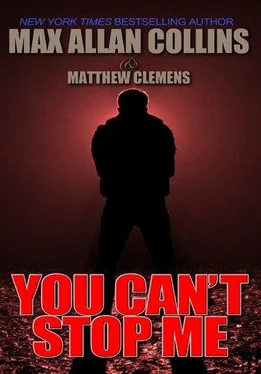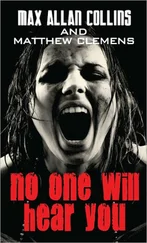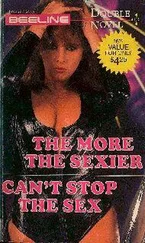As Dingle’s shot widened, Choi moved to another monitor, where a picture of a third bullet was waiting. “This slug came from Ellen Harrow. It’s bigger, the striations completely different.”
Looking at a bullet pried from his wife’s chest, televised or otherwise, sent acid rushing into Harrow’s stomach, and, involuntarily, he pictured his wife and son on the floor back in their home.
What was the son of a bitch who did it thinking, if he was watching this?
“What about the bullets on the other monitor?” Carmen was asking. “You said you had a match for one in the Ferguson murders — but not the Harrow case?”
“No,” Choi said. “This is new — that comes from a double murder in Rolla, North Dakota, two years ago.”
“Where has that led you?”
“Check back next week,” Choi said, delivering a scripted line very naturally.
The show was running smoothly, and Harrow was of course pleased.
But he also knew that by serializing this investigation on live TV, he was giving the killer a tutorial on what evidence they were finding, and how close they were coming to him. Of all the risks they were taking, this was the worst — instead of closing in on the killer, they might well drive him to ground, and never track the bastard down.
Carmen turned to camera and asked, “J.C., why didn’t the police in Florida pick up on this connection?”
Back on, Harrow said, “Carmen, they did run the bullets through NIBIN, but Rolette County in North Dakota — like many rural areas — hasn’t widely participated in the program. Only recently, through the state crime lab in Bismarck, did the information get into the database. The match we found has only been available for the last few weeks.”
“J.C.,” Carmen said casually, but scripted, “I understand you interviewed the surviving member of the Ferguson household.”
“Yes,” Harrow replied, framed against the stucco home in the moonlight, “this afternoon I spoke with Placida city marshal Ray Ferguson, here in his home.”
Microphone lowered, Harrow watched the monitor.
In a two-shot, sunlight filtering in sheer-curtained windows in the background, Harrow was seated in a straight-back chair facing a sofa where Ferguson sat.
Paunchier and generally older-looking than Harrow — though possibly as much as five years younger — Ferguson wore boots, jeans, and a blue denim shirt with a gold badge embroidered over the left breast. Jowly, with empty blue eyes and a wide nose, he had thin, bloodless lips over a strong chin.
“Marshal Ferguson, we’re sorry for your loss.”
“Thank you, sir,” Ferguson said, with a tiny nod. His baritone was soft spoken, with a touch of drawl. “I consented to this, Mr. Harrow, because I know you suffered such yourself.”
“Marshal Ferguson, would you tell us about that night, almost a year ago to the day?”
Ferguson had been expecting the questions, but the words hit him like tiny punches. His eyes glazed over.
“Marshal, I apologize for my bluntness. But I have to ask.”
He nodded. “Well, after work, I came home, and the lights weren’t on. Which surprised me, ’cause it was well after dark. Stella’s car was in the driveway, and that was when I first got spooked, really spooked. Just knew something was wrong.”
“Go on.”
“Rest of the block was quiet, but what really shook me was that the lights, in the other houses? They were all on. I’d kinda hoped that somehow it was... you know... a power outage or some damn thing.”
As he watched the monitor, Harrow winced when a close cut to the marshal’s trembling hands in his lap underscored the man’s misery. His own hands began to tremble, and he marveled that he’d been able to summon his inner cop enough to conduct this interview.
“I just ran into the house,” Ferguson was saying. “Or anyway I did after I got the door unlocked, which was another thing — Stella never locked the door when she knew I was coming home.”
Neither had Ellen.
“I suppose,” the marshal said, “he locked up after himself, to keep somebody from discovering what he’d done too soon. Of course, he’d have known I’d have a key. Do you suppose he wanted me to find them, Mr. Harrow? Did he do the same to you?”
“Please go on, sir.”
“Sorry,” Ferguson said. “Anyway, I went in, and there they were... all dead. All lying in the entryway, like they were there to... greet me. But it wasn’t... wasn’t me, was it?”
“Then you called the sheriff’s office.”
“Yes, and they arrived within minutes. Coroner told me that Stella and the kids’d only been dead for about an hour. If I’d got home earlier that night...? Maybe they would still be alive.”
“Marshal, that kind of speculation doesn’t do any good. Did you get home at your regular time?”
“Right around. Not much to marshaling in Placida, Mr. Harrow.”
“Nothing unusual that day?”
“No. On the way home, though, I did have a traffic stop. Not that that’s unusual.”
Sitting forward, Harrow asked, “Did you tell the detectives about it?”
“Oh yeah,” Ferguson said. “Perfectly routine. Guy was a salesman from Tampa, just passing through. Sheriff’s office and state patrol both did an extensive investigation into the guy. It was nothing.”
Live again, Harrow brought up his mic and said, “We interviewed Marshal Ferguson for an hour, and, thanks to his years as a trained investigator himself, he shared with us several puzzle pieces that for now we must withhold... because we know that our audience very likely includes the perpetrator of these crimes. Carmen, I understand you have more to share now, with our team...”
And as the image on the monitor showed Carmen back in the mobile crime lab, where she was introducing the rest of the superstar criminalists, Harrow lowered his mic. The show’s sign-off would follow Carmen’s last mini-segment, and would be handled by Moreno, back in LA.
But Harrow’s on-air claim of Ferguson providing puzzle pieces hadn’t been TV hype.
In the Ferguson living room, the marshal — late in the interview — had frowned and said, “You know, Mr. Harrow, there was this one thing.”
“Yes, Mr. Ferguson?”
“While I had that first guy pulled over, another vehicle, a pickup truck, was coming from the direction of my house... and it slowed way down, and the guy gave me, you know, the old hairy eyeball as he went by.”
“You made eye contact?”
“Oh, yeah. Impossible not to. He knew he’d caught my attention.”
“Did you tell the detectives about the guy eyeballing you in the pick-up?”
“No, sir, I don’t believe so. I forgot all about it till just now.”
“Did you get a plate?”
“No, damn it. Couldn’t even tell you the state. Don’t even know for sure what the make was. But it was blue — light blue.”
“Sounds like you got a look at the driver.”
“Yeah, I saw him, all right. That SOB was trying to tell me something with his eyes. Like he was sending a goddamn message. Sorry. Didn’t mean to curse on TV.”
“That’s okay. Could you recognize him?”
“You bet your ass I could. Sorry.” The marshal sighed. “You know, in my day, I wrote more than my share of traffic tickets, ran down kids for doin’ the kinda shit kids do, even investigated a burglary or two.”
“Yes, sir?”
“But this is the first homicide I was ever involved with — my own wife and kids.”
“It might have been him, your eyeball pick-up truck?”
Ferguson nodded, his mouth and chin tight. “You know, I can’t explain why I forgot about that truck till now. God damn it!”
“We’ll get you with an artist,” Harrow said.
Читать дальше


![Сьюзан Кейн - Quiet [The Power of Introverts in a World That Can't Stop Talking]](/books/33084/syuzan-kejn-quiet-the-power-of-introverts-in-a-wo-thumb.webp)









